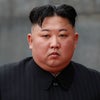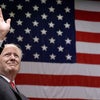A new US ambassador is waiting in the wings to travel to South Korea and deal with the winner of its hotly contested presidential election in March. Philip Goldberg, the ambassador to Colombia, is reported as the administration’s choice for the post, which has not been filled for more than a year.
Goldberg still has to go through the approval process by the Senate Foreign Relations Committee and then by the full Senate. He is, however, reputed to be a hardliner on North Korea based on his service over a decade ago with the State Department trying to get the United Nations to apply sanctions against the North for its nuclear and missile tests.
By the time Goldberg arrives in Seoul, South Korea will have a new president, and we’ll have a pretty good idea of where the North Korea-South Korea standoff is going, including the latest convolutions of the South’s policy towards the North and the North’s willingness to increase tensions with missile tests and possibly a seventh nuclear test. Goldberg’s goal will be to preserve America’s “unbreakable bond” with South Korea while insisting that North Korea show substantial signs of abandoning its nuclear program as a precondition for dialogue and a new agreement to ease tensions.
Interesting way, President BidenJoe BidenJan. 6 defendant asks to subpoena Trump as witness in On The Money trial – Breaking the January jobs boom Pics of the Week: Joe Biden, Punxsutawney Phil and Sarah Palin MORE, presumably on the advice of the National Security Council and the State Department, has not served as ambassador since the January 2021 departure of Harry Harris, a retired admiral and former commander of US forces in the Pacific. Although no one has officially acknowledged why the position remains vacant, the reason often given in Seoul is that the United States is awaiting the election of a successor to President Moon Jae-in, a liberal who longs for a declaration proclaiming the formal end of the Korean War.
By postponing the appointment, the United States could quietly show its distaste for any declaration of an end to the war that would lead to a peace treaty in place of the armistice signed in July 1953. The North Korean leader Kim Jong Un Kim Jong UnState media documentary admits North Korea ‘food crisis’ US pushes for talks with North Korea after latest missile launch North Korea sparks US condemnation with the last missile launch PLUS refused to engage with the United States or South Korea for nearly three years and, in defiance of sanctions, ordered a rapid succession of missile tests seen as a prelude to North Korea’s first test of a missile intercontinental ballistic test since November 2017. It’s even thought that Kim could lay the groundwork for the North’s first nuclear test since September 2017.
Kim Jong UnState media documentary admits North Korea ‘food crisis’ US pushes for talks with North Korea after latest missile launch North Korea sparks US condemnation with the last missile launch PLUS refused to engage with the United States or South Korea for nearly three years and, in defiance of sanctions, ordered a rapid succession of missile tests seen as a prelude to North Korea’s first test of a missile intercontinental ballistic test since November 2017. It’s even thought that Kim could lay the groundwork for the North’s first nuclear test since September 2017.
The Biden administration would theoretically want to reverse the negative trend of American reconciliation efforts with the North, which deteriorated with the failure of the Hanoi summit in February 2019 between Kim and the former President Trump Donald TrumpCanada’s Prime Minister Calls Truckers Protesting COVID-19 Vaccine Mandate an ‘Occupation’. It was eight months after Trump, in the first meeting between a US president and a North Korean leader, signed a vague statement with Kim in Singapore promising to work towards “a nuclear-free Korean peninsula”. Harris, who arrived in Seoul in July 2019 as ambassador, upset the Moon administration by opposing any declaration of an end to the war as long as Kim remains adamant against giving up his nuclear weapons and missiles to send warheads to distant targets.
Donald TrumpCanada’s Prime Minister Calls Truckers Protesting COVID-19 Vaccine Mandate an ‘Occupation’. It was eight months after Trump, in the first meeting between a US president and a North Korean leader, signed a vague statement with Kim in Singapore promising to work towards “a nuclear-free Korean peninsula”. Harris, who arrived in Seoul in July 2019 as ambassador, upset the Moon administration by opposing any declaration of an end to the war as long as Kim remains adamant against giving up his nuclear weapons and missiles to send warheads to distant targets.
There’s no way Goldberg could settle as ambassador in Seoul before the South Koreans choose on March 9 between candidates with vastly different views on North Korea, but he’ll certainly be watching carefully while deciding. how to deal with the winner. Polls show a close contest between leftist Lee Jae-myung, a former governor of the province surrounding Seoul, who would undoubtedly pursue reconciliation and appeasement with the North, and conservative Yoon Suk-yeol, a former prosecutor who wants to “rebuild” relations with the United States and insists that the North must give up its nuclear weapons as a condition of a deal.
Goldberg brings a long experience of careful and calculating diplomacy as an ambassador to difficult regimes. A Spanish-speaking specialist in Latin America, he is still ambassador to Colombia and ambassador to the Philippines before being replaced by Sung Kim, former ambassador to Korea who became special representative for North Korean policy. Goldberg is expected to press ahead with his demands for denuclearization, but could temper them with the lure of humanitarian aid and a possible easing of sanctions in hopes of bringing the North to dialogue.
Goldberg’s toughest challenge will be to preserve the U.S.-South Korean military alliance as a solid antidote to North Korea’s dream of ending the alliance and abolishing the UN command under which the United States, South Korea and 16 other countries fought the North Koreans and the Chinese in the Korean War. In the process, North Korea hopes to bring about the withdrawal of 28,500 American troops from South Korea. A particular focus would be to ensure continuity of joint military drills, conducted largely on computers since Trump canceled the drills in 2018 after meeting Kim in Singapore. US commanders say computer games are no substitute for the field maneuvers of US and South Korean forces and they are eager to restore them to that level.
The job of ambassador will, however, go beyond North Korean issues. Victor Cha, who served as the National Security Council’s director for Asian affairs under President George W. Bush and is now a professor at Georgetown University, notes that the left and right in Korea “also disagree on important alliance issues; energy and climate change issues; dealing with China; and whether South Korea should seek a seat on the Quadrilateral Security Dialogue (known as the Quad), made up of the United States, Japan, India and Australia.
Donald Kirk has been a journalist for over 60 years, focusing much of his career on conflicts in Asia and the Middle East, including as a correspondent for the Washington Star and the Chicago Tribune. He is currently a freelance correspondent covering North and South Korea. He is the author of several books on Asian affairs.
 HS Alliance
HS Alliance